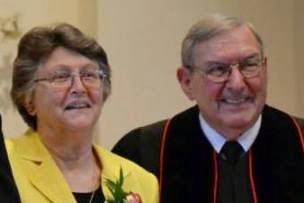I Was Just Thinking About - - -
We’ve arrived at the time of year when various “New Year’s Resolutions” will be listed and stated. The idea is that some area where self-improvement or correction is needed will be accomplished as the New Year begins. A question that is fair to ask is: How well has that worked in the past? How many resolutions have been made but all-too-soon forgotten or compromised? How often are similar resolutions made at the beginning of most New Year’s Days? By definition, a resolution is: “The act of determining upon an action, method or procedure; a decision or determination to do something.” With the best of intention, people will make a resolution designed to result in change and satisfaction as the goal of the resolution is reached.
It is indicated on the Cyber Hymnal website that in 1896, “James H. Fillmore, Jr. wrote a religious song for use at the convention of Christian Endeavor in San Francisco, California. Fourteen trainloads of people sang the song as they journeyed from Ohio to the Convention.” Some of the lyrics in the Hymn suggest the following as a spiritual resolution and determination:
I am resolved no longer to linger,
Charmed by the world’s delight,
Things that are higher, things that are nobler,
These have allured my sight.
I am resolved to follow the Savior,
Faithful and true each day;
Heed what He sayeth, do what He willeth,
He is the living way.
Refrain
I will hasten to Him, hasten so glad and free;
Jesus, greatest, highest, I will come to Thee.
I will hasten, hasten to Him, hasten so glad and free;
Jesus, greatest, highest, I will come to Thee.
In Luke 21, Jesus is calling and preparing His disciples for their world-wide mission. He does so in the context of “perilous times” that will be marked by “warfare, great earthquakes, famines, pestilences, fearful sights and great signs from heaven.” In addition to these things, Jesus stated in Luke 21:12-14, “But before all this, they will seize you and persecute you. On account of My name, they will deliver you over to the synagogues and prisons, they will bring you before kings and governors. This will be your opportunity to serve as witnesses. So make up your mind – be resolved – not to worry beforehand how to defend yourselves. For I will give you speech and wisdom that none of your adversaries will be able to resist or contradict.” Just a passing thought: Are we living in the day of which the Lord was speaking? Is this a day when resolve and purpose must be the priority of our lives in terms of Christ and His Kingdom? The Apostle Paul addressed the need for resolve and purpose in Ephesians 6:10-13, “Finally, be strong in the Lord and in His mighty power. Put on the full armor of God, so that you will be able to stand firm against the devil’s schemes. For our struggle is not against flesh and blood, but against the rulers, against the authorities, against the cosmic powers of this darkness, and against the spiritual forces of evil in the heavenly realms. Therefore take up the full armor of God, so that in the day of evil you will be able to stand your ground, and having done everything, to stand.”
All professing Christians should be ready and eager to demonstrate the reality of what it means to be committed to Christ and the work He ordained to be done. Whatever resolution(s) we think need to be made should include that we are ready to be engaged in the task Jesus mandated must be done. Each of us can and should resolve to do our part in this assignment. Consider these things with me.




